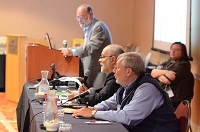On November 11-12, 2011, the Center on Human Policy (CHP) celebrated its 40th anniversary with a two day symposium held at Syracuse’s Crown Plaza Hotel. The Center was established in 1971 in response to widespread abuse of and discrimination against people with disabilities in society. Its philosophy and early activities grew out of the institutional exposés of its founder and first director, former School of Education dean Burton Blatt.
A few of the CHP’s many milestones over the past 40 years include:
- 1972: SU professors participate in formulating the famous NYSARC vs. Rockefeller case that led to a court decree mandating reforms and deinstitutionalization at the Willowbrook State School.
- 1974-75: The Center on Human Policy helps to establish Syracuse Disabled in Action, the first disability advocacy group in Central New York led by people with disabilities.
- 1987: Faculty produce the first national film on school inclusion, which airs on PBS.
- 1991: SU sponsors the first national conference on gender and disability, and becomes the first research university with an inclusive teacher-training program.
- 1995: SU founds the first disability studies program in the nation.
- 2001: The Beyond Compliance Coordinating Committee (BCCC), a student disability and advocacy group, is formed
- 2003: SU initiates the first joint degree program in Law (J.D.) and Education (M.S.) in Disability Studies in the nation
- 2011: SU Disability Cultural Center Established.
The CHP has progressed through the years to meet the evolving needs of and challenges facing people with disabilities. Through advocacy, research, training, consultation, education and the production of resource materials, the Center has continued to advance the rights of individuals with disabilities on local, national, and international fronts.
Today, the Center has expanded into a network of academic programs, centers, student organizations, and affiliated faculty to comprise the The Center on Human Policy, Law, and Disability Studies (CHPLDS). In collaboration with Taishoff Center on Inclusive High Education, Schools of Promise, the Institute on Communication and Inclusion, SU’s Parent Advocacy Center, the Disability Rights Clinic at SU, the Beyond Compliance Coordinating Committee, and the new Disability Cultural Center, the CHP continues its work through efforts geared toward creating inclusive opportunities in schooling, employment, athletics, politics and social endeavors.
 Aptly stated by John O’Brien, a member of the Center and a keynote speaker at the anniversary conference, “The Center on Human Policy is about people having the opportunity to learn by getting close to the experience of other people. By being able to listen for different perspectives, to listen with respect and curiosity to what other people are experiencing, to learn from differences.”
Aptly stated by John O’Brien, a member of the Center and a keynote speaker at the anniversary conference, “The Center on Human Policy is about people having the opportunity to learn by getting close to the experience of other people. By being able to listen for different perspectives, to listen with respect and curiosity to what other people are experiencing, to learn from differences.”
The CHP 40th Anniversary Celebration brought together individuals who have been affiliated with the Center since its inception, past and present faculty, graduate students, self- advocates, and community members, to reflect on and applaud the great work it has done. This celebratory gathering featured an array of presentations from retrospective, current and forward-looking perspectives. Highlights of the first day included professor emeritus Robert Bogdan discussing his forthcoming book “Picturing Disability: Visual Rhetoric and Qualitative Research”; an examination of disability studies’ expansion into the humanities by Stephen Kuusisto, director of the Renee Crown University Honors Program, with an introduction by Beth Ferri, associate professor of teaching and leadership and disability studies.
Day two featured panels on “Creating the Inclusive Campus,” “Self-Advocacy: Past and Future” “What Can Parents Today Learn from the Advocacy of Parents in the 1970s and ‘80s?,” “The Institute on Communication and Inclusion: Supporting Voice, Access and Inclusion for 20 years;” and “The Beyond Compliance Coordinating Committee (BCCC): A Decade Retrospective.” Susan Thomas and members of the North American Social Role Valorization (SRV) Council also led an all-day concurrent session chronicling the history and evolution of SRV, a principle introduced by Dr. Wolf Wolfensburger in 1983.
The conference featured an anniversary reception during which Dean Douglas Biklen honored Ethel Blatt, widow of the CHP’s founder Burton Blatt, with the William Pearson Tolley Medal for Distinguished Leadership in Lifelong Learning. With this award, Blatt was recognized for her outstanding efforts in advocacy and philanthropy on behalf of people with disabilities’ access to education, support and meaningful employment—foundational values of the Center on Human Policy.
The well attended conference provided an opportunity for reunion, reflection and reinvigoration for those who aim to ensure that the Center on Human Policy continues doing this work well into the future. If one attendee’s observation is any indication, it is likely that we will be gathering to commemorate another 40 years down the road. Regarding the status of the Center today, she said, “I see the passion still.”
